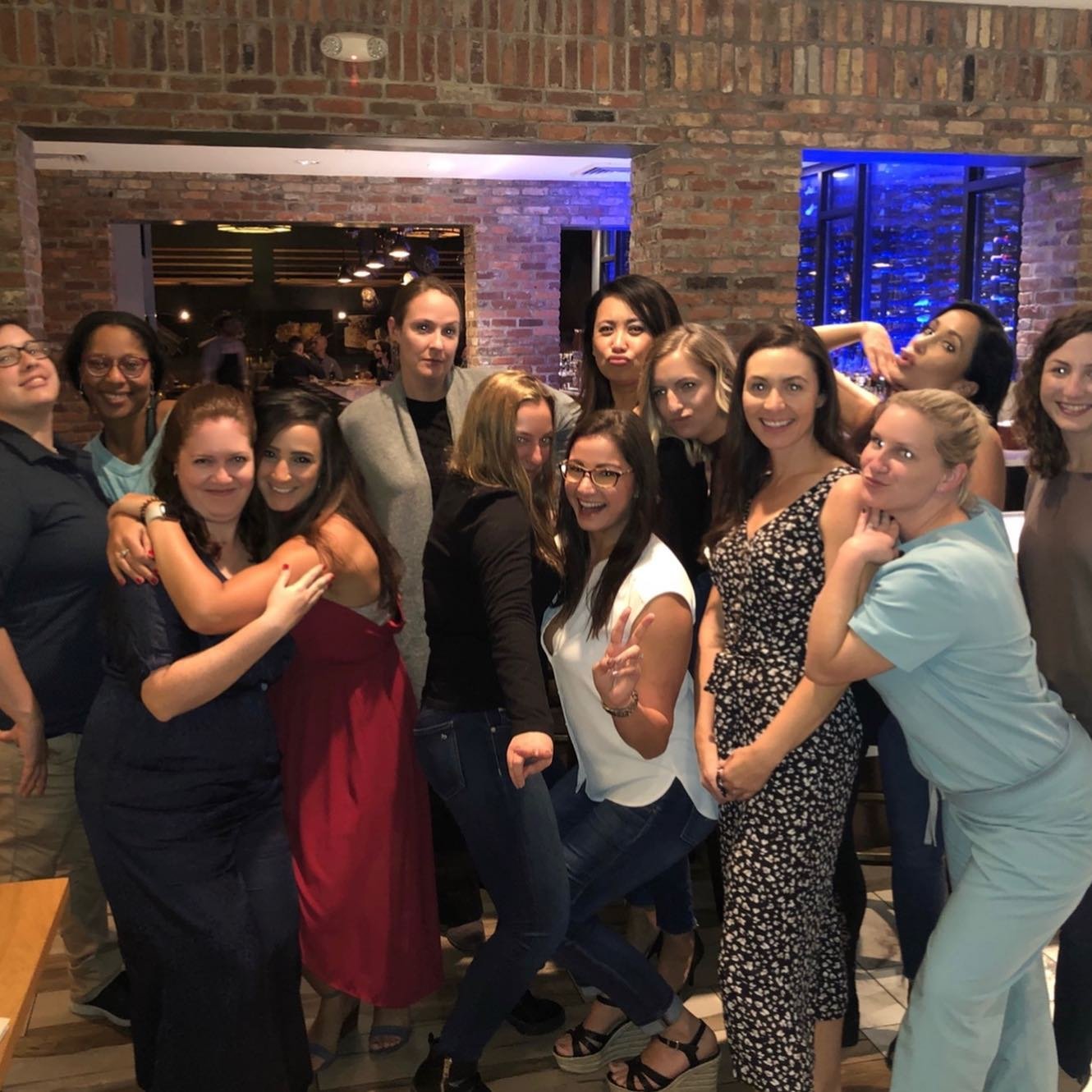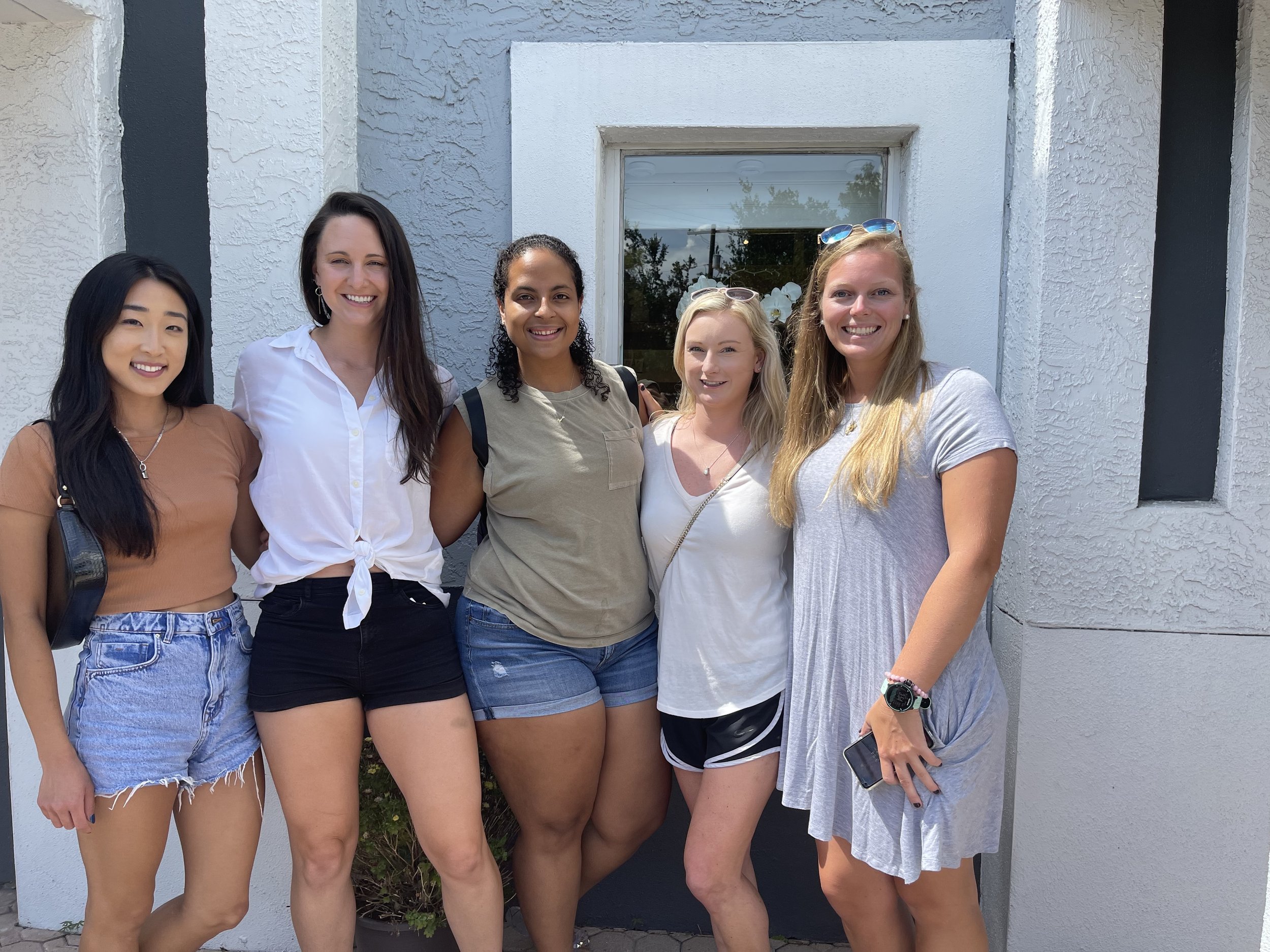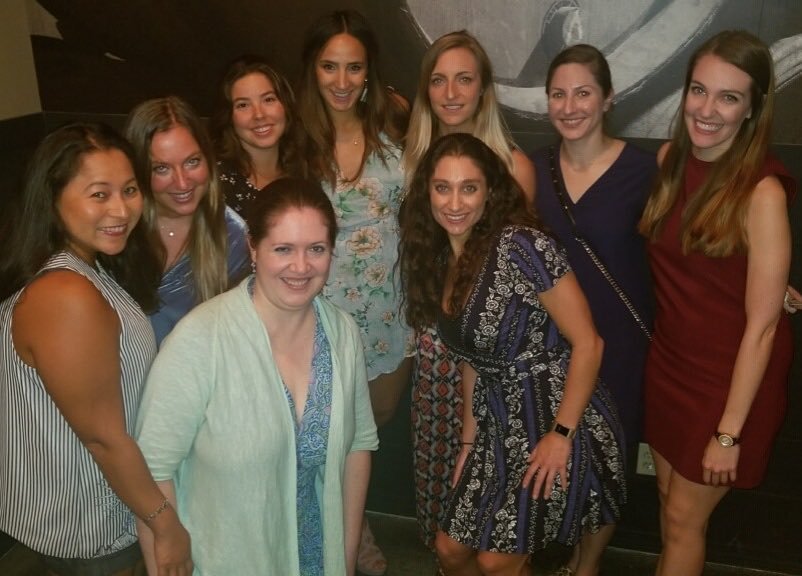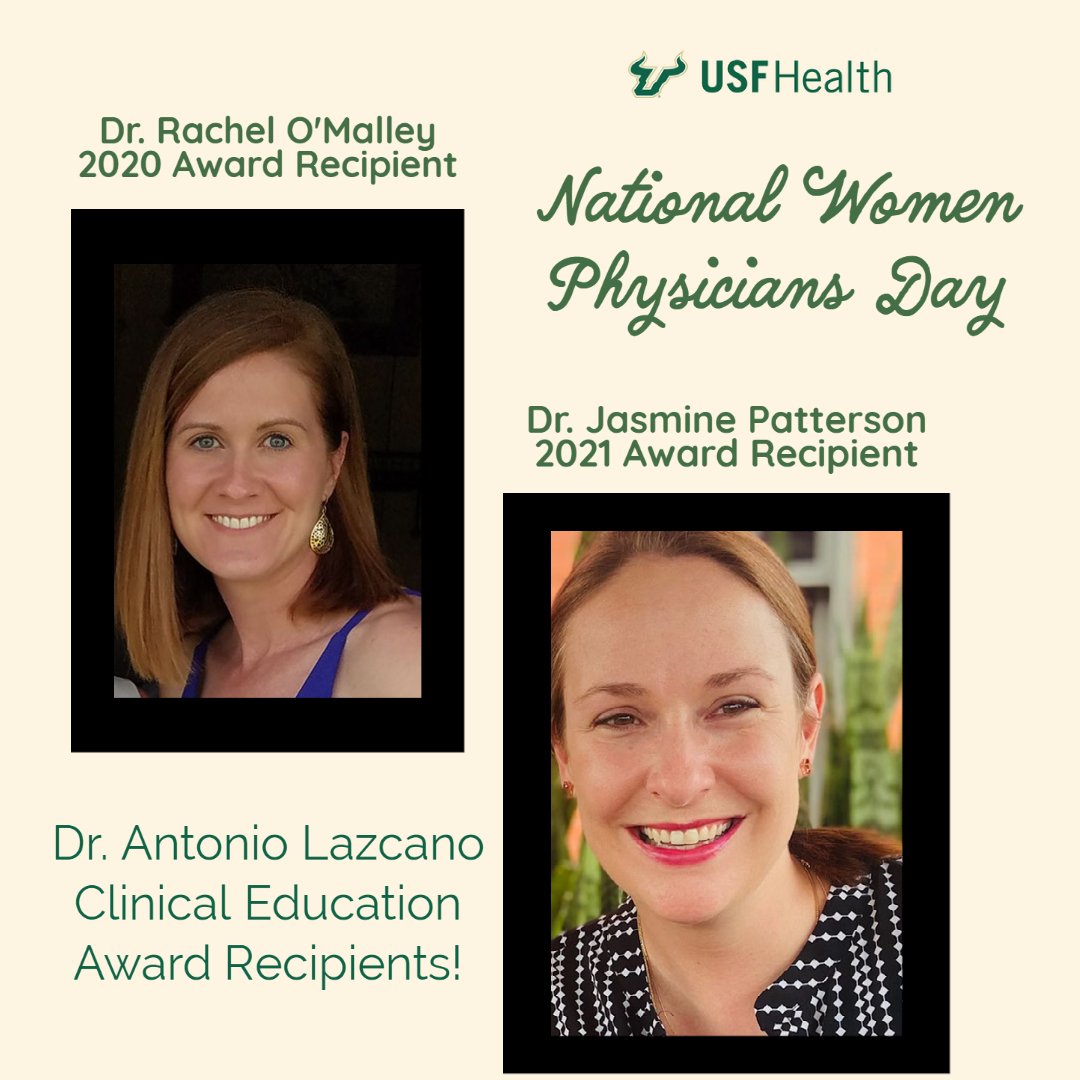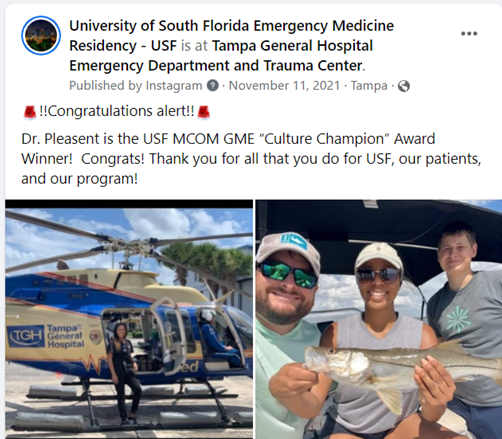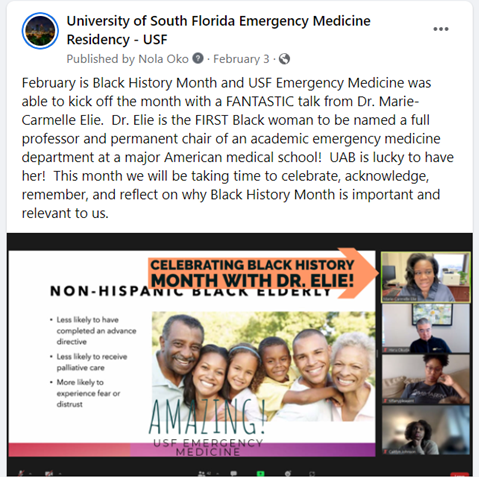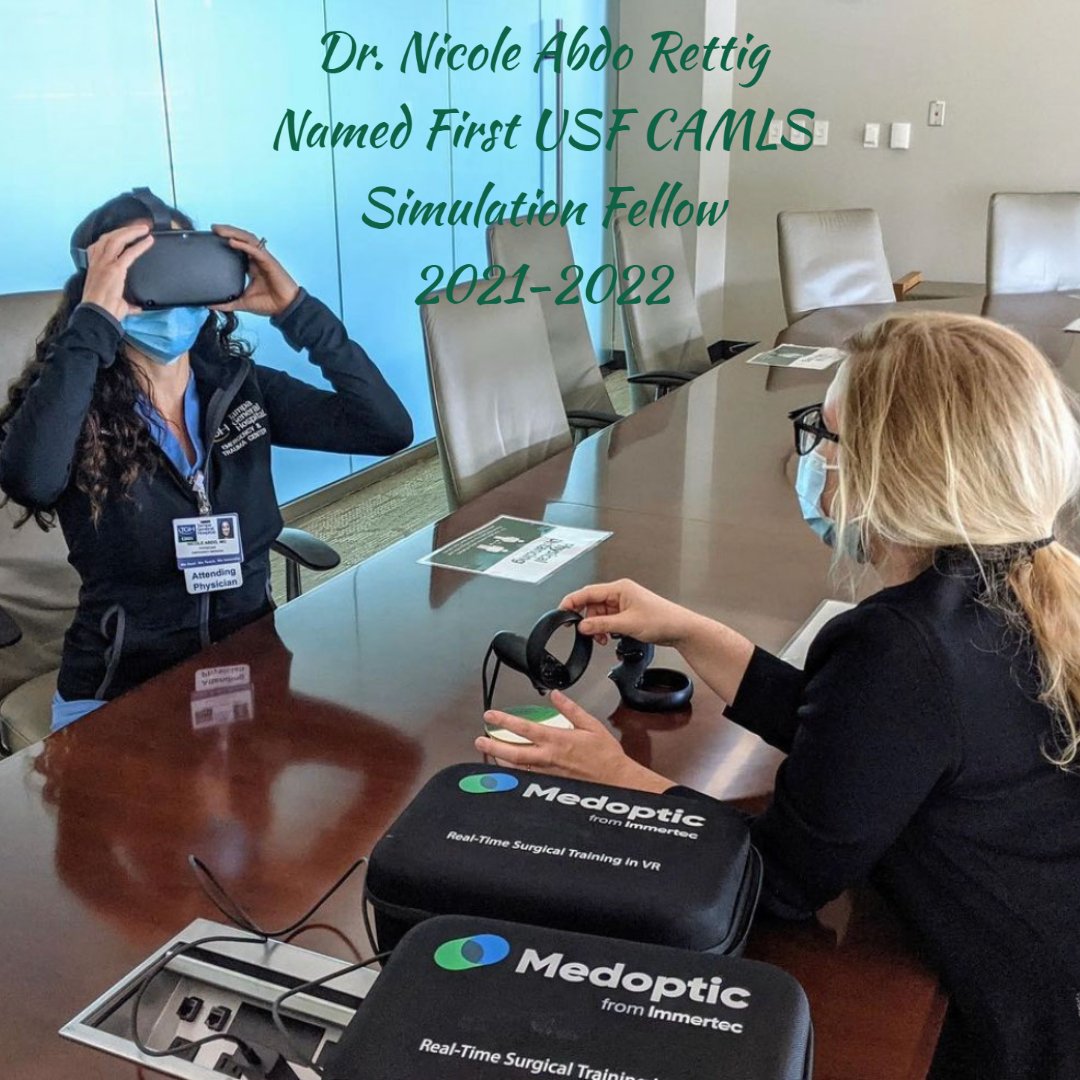Women's History Month Special!
March is Women’s History Month and what a great reason to feature some of the amazing women on our team! Women are essential to our organization and are especially important in academic medicine, where women have historically been underrepresented. In the United States, female EM physicians make up only about 28% of the academic workforce. At USF, approximately 40% of our faculty are female and many of them serve in additional leadership roles - making USF a great place to find a mentor! When it comes to emergency medicine, physicians aren’t the only ones with an important role in the department. Emergency medicine requires a team approach that is somewhat unique to our specialty. In this month’s blog, I’ll feature some of our remarkable USF/TGH team members. I can’t wait to do more posts like this, because there is no shortage of additional women that deserve to be highlighted!
Dr. Charlotte Derr
Dr. Derr is the first woman to serve as the Program Director for USF Emergency Medicine.
Dr. Derr has actually devoted her entire professional career to USF Emergency Medicine Residency! She was initially hired as the Ultrasound Director for our program and later served as the Assistant Program Director. In 2010 she established an ultrasound fellowship for trainees. In 2017, she became the first woman to be named the Program Director for our residency. This is a role she considered an honor but she also realized it came with a lot of pressure.
She had clear goals as she stepped into the role of PD:
1) Create a culture that values wellness and is receptive to resident feedback
2) Provide an exceptional educational experience
3) Foster an environment of respect, collaboration, and inclusion
She immediately lowered the total number of hours residents were working and created shifts with an hour of overlap to reflect national trends and promote a healthier work-life balance. She began collecting input from the residents and taking action! Incorporating resident suggestions resulted in numerous beneficial changes within the program including creating new elective opportunities and a longitudinal peds experience. She made additional improvements to education such as creating new asynchronous learning opportunities through the use of popular EM resources such as HIPPO EM which allowed conference time to be reduced from 5 hours to 4, adopting the Foundations curriculum to ensure residents received core content education in a method that was case-based and interactive, and she established a procedural cadaver lab in conjunction with our Simulation Director to provide residents with an unparalleled training experience.
Dr. Derr’s third goal was lofty, but incredibly important and something she remains passionate about. She envisioned a program where everyone had the ability to reach their potential through a culture built on respect, collaboration, and inclusion. In order to achieve this goal, she has focused on the importance of developing mentor programs, establishing diversity, equity, and inclusion initiatives, and incorporating cultural competencies and bias training into our curriculum.
It would be impossible to talk about her without also recognizing that she led an EM Residency during the Covid-19 pandemic, prioritizing resident safety and education - that’s certainly history worth mentioning!
Dr. Derr is a trailblazer in EM Ultrasound!
Dr. Derr is a national ultrasound expert and is responsible for rolling out the resuscitative Transesophageal echo (TEE) program in our emergency department, making our program the first in Florida.
I asked Dr. Derr, “What advice do you have for women considering EM?” Her response was simple but resonates, “Align yourself with strong mentors who can open doors for you and keep an eye out for opportunities for you. Develop a niche within EM. Don't take on too much at one time. It's OK to say "no". Allow yourself time to enjoy life's special moments.” Outside of medicine, Dr. Derr enjoys fitness (just ask her about the 12 week Challenge she created for our hospital), snowboarding, scuba diving, learning to paint, capturing sunsets, and spending time with her husband and family. To hear more about her, check out our “Meet our Program Director” video.
Dr. Jillian Kiely
Dr. Jillian Kiely is one of our emergency medicine residents. She carries herself with a sense of maturity and awareness that is rarely developed so early on in one’s career, maybe that is the result of working in pharmaceutical consulting and obtaining a Master’s in Public Health prior to medical school. Her prior experiences have helped her succeed in residency and in the coming year, she will serve as a Chief Resident. I asked Dr. Kiely what her goals were in this new role and she responded, “My overall goal will be to promote a positive residency culture where residents have both formal and informal opportunities to provide feedback on their residency experience. Specifically, in my role as Scheduling Chief, I would like to create scheduling solutions that allow residents to pursue a special project or rotation while still meeting all ACGME requirements.”
Dr. Kiely has a passion for Global Health.
Dr. Kiely obtained a Master’s in Public Health and has prior international medicine experience. In true Dr. Kiely fashion, she went above and beyond being a resident with an interest in Global Health and was a co-creator of an International Medicine Lecture series during the 2021-2022 academic year. As you can imagine, Covid-19 created many obstacles for international travel during residency, but it made global health and having an international perspective more important than ever. She recognized this as an opportunity and quickly established a high quality lecture series designed for medical students and residents.
Dr. Kiely is a natural leader so during my interview with Dr. Kiely, I wanted to hear more about her views on female leadership in medicine. I asked, “Do you think it's important to have women in leadership positions in medicine?” She replied, “I firmly believe it is important to have women in leadership positions in medicine because women offer a different perspective or way of solving a problem compared to men. Perhaps it is the stronger cross-talk between hemispheres in female brains! Additionally, women serving in leadership roles in medicine are excellent role models for younger women who are interested in leadership and administrative positions. Having female Program Directors is one of the things that drew me to USF. We need more women in positions of power!” And now for the tough question, “Have you experienced gender bias as a female resident physician and if so, what advice can you share with other residents experiencing gender bias?” “While I do think gender bias still exists in medicine, things are changing. I truly do not think I have experienced any gender bias from colleagues – if anything, they are fantastic allies when patients exhibit gender bias. I recall one instance where a patient assumed his (male) nurse was the doctor and I was the nurse. I just politely told the patient “No, your nurse is a male and your doctor is a female.” I think as times continue to change and generations evolve, these sorts of assumptions will become less and less common. I would say the best advice to young female physicians I can give is stay polite and professional but do not allow patients to call you anything other than “Doctor” – and correct them if they do.”
Life outside of medicine….
What does Dr. Jillian Kiely enjoy outside of medicine? She is a wife and dog mom! She enjoys exploring with them and traveling. Her other hobbies include working out, cooking, and learning to knit more than just scarves (which aren’t very useful in Florida).
Vanessa Cirri, RN
About a year ago I shared a patient with Vanessa and watching the compassion and empathy she had for our patient was inspiring. It reminded me of why I went into medicine. Her level of empathy and compassion proved to be as important to our patient as the medical management I was trying to provide. Our patient was suffering a Type A aortic dissection and was quite unstable. I was laser-focused on optimizing his hemodynamics, getting a CT scan, and tracking down a surgeon. Vanessa was the one that recognized the fear in his eyes and helped him remain calm. She spoke quietly and held his hand. She reassured him and listened to him, all while managing multiple medication drips and performing her other nursing duties. She offered to call his wife before the surgery. Her actions seem simple, but when you work in a busy ER, it is easy to lose that type of connection with patients. This wasn’t the first time, or the last time, I heard Vanessa use that soft, reassuring tone with her patients. Recently, I asked her how she maintained that level of empathy and connectedness to her patients because it is something we should all strive to do. She responded, “It can be hard, especially during covid times. People can be irate, disrespectful, and just plain unkind, but you get those few individuals that are appreciative and share a kind word or express their gratitude. I harness that energy, tucking it away, holding firm to the idea that those are the people that are more prevalent in the world. The kind, appreciative people, and most days it helps keep me bonded with my patients.” My interactions with Vanessa made me curious why she chose nursing. I always tell my residents, “Don’t forget the Why behind why you chose medicine.” Her answer surprised me.
“I became a nurse for all the wrong reasons. Growing up I never had the aspiration to be a nurse or a doctor. My parents did not go to college and my father moved to the U.S at 16 and started working with no more than a middle school education really. So the concept of going into a medical career was something I never thought of. I wanted to become a teacher. It was not until I got married and divorced at a young age that a friend told me to attempt nursing school. I was a young mother that wanted to be both self-sufficient and available for my daughter. So, the schedule of working three days a week with lots of flexibility appealed to me. The irony of that statement now! Nursing does offer a lot of opportunities and freedoms. There are so many different types of nursing care and each is important...” I guess hearing her response was surprising because I find her to be such a fantastic nurse. In all reality though, emergency medicine is appealing to many women for the same pragmatic reasons. Though she doesn’t carry the official title of a teacher, she is definitely teaching us all to be better providers. She recently stepped into the role of a Relief Charge Nurse and I have a feeling that position will entail a lot of learning and teaching as well.
In my interview with Vanessa, she shared with me why Women’s History Month is important to her:
“Women’s history is our history, especially now. The world is growing and evolving. For me, it’s a time to reflect on those who preceded us, and those that led the way. A time to reflect where we once were as a society and celebrate the women that laid the foundation and the women that encourage, support, nurture and mentor another generation of women to do the same. This is important to me because I’m a mother trying to raise strong women. I want my daughters to have the same opportunities in life that other mother’s sons have.”
I can’t help but wonder if Vanessa’s experience being a mother of young girls gives her a unique perspective as she cares for patients and interacts with physicians. I decided to ask her a difficult question - Have you experienced or witnessed gender bias in medicine? “While nursing is still predominantly a female field, I have been fortunate enough to not experience gender bias personally. I have however, witnessed on multiple occasions, female physicians that were undermined or depreciated. I witnessed a colleague that is an attending physician, get belittled by an older gentleman saying, “You can go get your boss now.” Implying that she was not the one in charge because she was a woman. When the attending physician explained to the patient that she was going to be the one managing his care he replied, “Oh no, I need that male doctor back” (the resident). The resident then explained to the patient how she was “the boss” and the patient replied, “How did that happen?” I was astounded by these comments, I genuinely did not think people still believed or voiced this absurdity.” This is a great example of why Women’s History Month should be important to us all. As far as we’ve come, there’s still work to be done!
Describe the team dynamic in the ER and a time that stands out.
In my final question to Vanessa, I asked her to describe the team dynamic in the ER and if she could recall a time that stood out. “The teamwork in the ED is why I love the ED…The physicians are approachable and willing to collaborate with the nursing staff for exchange of critical thinking ideas and suggestions on plans of care…I was part of a team that saved a young woman in cardiac arrest. The team was led by female physicians and it was a female resident that had the idea to do a FAST exam on this woman, which ultimately saved her life. I followed her case for weeks because she was down for so long. The woman ended up with an emergent surgery, tracheostomy, and a prolonged hospital stay. A few days before she was discharged the resident went to see the patient and shared with me that the patient was fully functioning neurologically. While these stories are far and few in between, it makes the job worth it.”
Dr. Melissa Leming
Dr. Leming is an EM Attending Physician at TGH and the Hillsborough County Mass Casualty Director. She completed medical school here at USF, residency at Christiana Care, and completed a Disaster Medicine Fellowship at UMass. Every year Dr. Leming plans mass casualty drills for Hillsborough county and our program. In addition, she assists with the placement of special needs populations into hospitals and shelters during real disasters and responds to disasters at the Hillsborough County EOC Emergency Operation Center. Her ability to help her community prepare and respond to disasters is one of the aspects of her career she is most proud of.
Dr. Leming speaks about the importance of work-life boundaries.
You will be hard-pressed to find a woman who loves medicine more than Dr. Leming. It shows in the way she cares for her patients and in the way she teaches the resident physicians she works with. She’s wickedly smart and full of enthusiasm for her job. She takes pride in working at a teaching facility and seeing the resident physicians transform into capable attending physicians. She describes her time at work caring for patients and teaching residents as “one of the joys” in her life. So what are the other joys in her life? A few years ago she became a wife and mother and since then she’s been on the journey that so many female physicians face - how to be an amazing wife, mom, doctor, and still make time for herself too (she loves reading, running, and wine tasting).
After becoming a mother, she shifted her ER schedule to nights which allows her more control over her schedule. I wanted to talk to Dr. Leming about her life as a mom, wife, and 3rd shift ER physician because I think many women are looking for guidance on how to succeed in all these roles. “Dr. Leming, what does a typical workday look like for you?” “I wake up around 4:30 PM and have a cup of coffee while snuggling and playing with my 2-year-old. At 5PM I pack for work and have an early dinner with my family from 5:30-5:50PM. I leave for work 6PM and work from 7PM-7AM. I get home around 8:30AM and watch an episode of Mickey Mouse Club House while my kid slowly wakes up on my lap and then I go to bed. I am lucky that my husband is able to cook dinner for the family most nights which gives me more time away from the kitchen and with my family.”
When asked what advice she had for other women trying to find the right balance she said, “Create time in your schedule for working at home and some family time and stick to it. When I'm working from home, I am in my office with the door shut. When it is time for my family, all work is put away and out of sight. The dedicated time and mental divide is very important to give each my complete attention.”
Her message to young women considering a career in medicine was clear, “If you’re passionate about medicine, you should reach for your dreams. Medicine is much more open to women today than decades before. Women are able to have a very rewarding career and family life simultaneously.”
Eva Larson, PA of the Year!
Eva Larson is a Physician Assistant (PA) who completed her training at the Medical College of Georgia and completed an additional year of training (PA residency) in Emergency Medicine. She has worked in the ER ever since where she has maintained her love for learning and her desire to provide the best care possible for her patients. In 2020-2021 she was named Tampa General Hospital’s PA of the Year. I asked her how it felt to receive such an award and she responded, “I can’t even begin to tell you what it felt like, it was an honor and very humbling. That was a rough year for our ER (Covid-19 hit our community hard) and to be recognized was such accolades it made me want to work harder. I felt like I needed to earn it.” Anyone who has ever worked a shift with her can attest that she is deserving of the award!
In addition to emergency medicine, Eva has taken courses in Wilderness Medicine and is actually working on a Wilderness Medicine Fellowship. If she’s not in the hospital you can find her spending time with her family which she describes as her “heart and soul”. Whether they are camping, paddleboarding, cooking, or exercising - they are together.
Eva Larson, PA, shares memories of her mother and why she finds inspiration in her family history.
“When I reflect on Women’s History month, many women come to mind, Rosa Parks as a symbol of civil rights movement, Marie Curie, Malala Yousafzai, Amelia Earhart, but the one that truly sticks in my head is my mother. A woman born in a very large and low-income family. She made her way through life with a fourth-grade education. She had four children, three of which were back-to-back, poor thing was pregnant for 3 years straight. Born in the 1930s, she lived in a very male chauvinistic Spanish culture. She never held a job outside the house. She made breakfast every morning for all of us, but she would always take breakfast to my dad in the bedroom first before he would head out to work, that was the custom. She did all the chores of the house, never really complaining. She filled the role that was expected of women at that time; yet my mother always taught all of her girls to never depend on a man, to work hard, to study hard, to make something of ourselves, so we never had to depend on a man. I recall going through PA school where classes were 8 to 5 every day for a year with back-to-back exams. It was quite brutal and so many times I just wanted to quit, but it was my mom’s voice that kept me going. “Don’t ever depend on a man.” I have my mother to thank for that, for she inspired me to be the woman I am today and break away from that chauvinistic archaic thought of the time…”
Dr. Juliana Lefebre
Dr. Juliana Lefebre is the Director of Aeromed, a life-saving air service made up of more than 75 pilots, nurses, and medics. She is the WOMAN responsible for making sure their protocols reflect the most up-to-date medical practices. Her protocols are the guidelines used to care for critical patients transported by the Aeromed team and she ultimately carries the responsibility of educating and providing medical control coverage for Aeromed. Sound like a high-pressure job? It’s nothing that Dr. Lefebre can’t handle!
What advice does she have for other females considering taking on a major leadership position?
“You can do it! Don't ever let anyone persuade you otherwise. If you have the ambition and willingness to go through some tough times, you can succeed.”
Dr. Lefebre completed medical school at the Georgia campus of Philadephia College of Osteopathic Medicine. She went on to complete her EM residency and EMS fellowship right here at USF and was ultimately hired as the Director for Aeromed. Her hard work, dedication, and charisma have undoubtedly made her an effective leader and a successful emergency physician. In the coming year, she will be working with her team to participate in the Elevate 2022 conference, an air flight medical conference hosted in Tampa this year.
In addition, she works as an Attending Physician at TGH with our residents and is an active participant in our Women in EM group. She is someone who sees the value in mentoring so I asked her, “What role do you feel mentors play for women in medicine?” She replied, “I believe mentoring encourages others to pursue the things that they didn't feel were possible or that they were afraid of.”
What is Dr. Lefebre most proud of in her career?
I am proud of completing my EMS fellowship and becoming the Medical Director for Aeromed, but I am even more proud of becoming a mother and still being able to balance my job in the emergency department and with Aeromed. It's like having three full time jobs.
Dr. Jennifer Shin
Right about this time last year, our residency had just matched Dr. Jennifer Shin, from Albert Einstein College of Medicine in New York. During her interview, she won us over with her cheerfulness and poise (her stellar CV was also impressive). She still carries that pleasant demeanor with her every day at TGH, where she is excelling as an emergency medicine resident.
Dr. Shin’s interests in medicine includes critical care, social medicine, and global health. As she nears her PGY 2 year she is focused on taking time each shift to learn how to work up a particular type of patient really well. She admits that the thought of being a second-year resident is exciting but feels daunting at times.
I can attest from my personal experience during residency that the transition between intern year and second year, feels like a big jump in emergency medicine and is a challenging time. It’s important to be surrounded by uplifting colleagues and mentors during training to help with such adjustments. I asked Dr. Shin, “Does your training environment provide adequate exposure to women in leadership and mentors to help you navigate your career goals?” “Yes!” she responded, “One of the things that stood out about USF was women in leadership. It is very empowering to see and be surrounded by. It's great showing up to work and seeing that many of the attendings are female.”
As you reflect on Women’s History Month, who inspires you most?
“My mom! She's always been the most positive and supportive person I have ever known. Everyday she inspires me to carry myself the way that she does.”
What advice do you have for other young girls or women considering a career in medicine? “We've all worked extremely hard to get to where we're at now. I think my strongest advice is to stay true to yourself and don't let biases or others' opinions bring you down.”
Dr. Jennifer Shin and co-resident, Dr. Nabi Ferra, who participated in the couples match in 2021.
Dr. Megan Tyler
Dr. Tyler is an EM Attending Physician at Tampa General and currently leads our Women in EM Mentoring Group for USF Emergency Medicine. Dr. Tyler completed medical school at SUNY Upstate Medical University and EM residency at USF. I asked Dr. Tyler, “What is your inspiration behind leading the Women in EM group at USF?” She responded, “After moving to Tampa from NY without any friends locally I relied a lot upon my female colleagues in EM for support, mentally, emotionally and professionally. Residency is a difficult time and EM is a challenging specialty. I wanted to create a network of support for all of our current and incoming female physicians to help navigate the challenges that we face in this male-dominated field. By finding a mentor or network of mentors, women can have guidance and support from people who have been through what they are going through. Every female member of our residency and faculty have different perspectives and experiences navigating these challenges through different stages of training and life.” Dr. Tyler had this to say for young women considering a career in medicine, “Go for it! It's scary but so worth it. I have been through a medical school long-distance relationship, moved across the country, struggled with fertility and navigated becoming a new mom and new attending at the same time. Every time I faced one of the challenges the thought of tackling it seemed so overwhelming but then you realize you are stronger than you think. And when you come through on the other side you realize how much you've grown from these experiences. It's not easy but it is possible.”
What are Dr. Tyler’s hobbies outside of medicine?
When she’s not in the ER, She likes to go paddleboarding, attend sporting events, play piano, and chase her toddler around!
Hazel Hinds, RN, CCMC,
MSN
At TGH we are lucky to have Case Managers on our ED team and Hazel Hinds is one of those incredible people! She has the challenging role of helping determine the best resources for the patient and assisting with an endless list of tasks centered around reducing bounce backs and readmissions, patient transfers, and referrals for other services.
Hazel is the type of person who is always encouraging those around her. She has a genuine desire to help the medical team and our patients. I asked her, “What do you love most about your job?” She responded, “This might sound corny, but I love the people I work with. I like helping others who need help.”
Why is Women’s History Month important to you?
“Women's history month is time to showcase to our young women that women can become whatever they dream. While it seems like everyone knows who Rosa Parks was, not everyone knows how female code breakers were instrumental in the success of WW ll. Mainstream media showcases some of these important historical female figures via movies such as Hidden figures and Self Made during Women's history month…Women's history month reminds us that women are instrumental in making change throughout the world. This validates the importance of women to our younger female generations and encourages them that they too can reach for the stars and make historic changes. ”
What role do you feel mentors play in a women’s professional development?
“There are very few female-dominated fields. Having a strong female mentor is very important in helping young female professionals to navigate a mostly male-dominated world. While there are more female professionals breaking the career glass ceiling, it can be a very daunting world for a young female professional to navigate. A successful mentor can guide, advise, and be a sounding board for their mentee.”
Can you tell me about your hobbies outside of work?
“I love shooting (yes, guns at the shooting range), scuba, bicycling, reading, and listening to audio books. My favorite pastime is spending time with my granddaughter and developing her interest in riding, soccer, gymnastics and shooting.”
Did you catch these HISTORICAL Moments featuring women in our Department?
Aeromed: 30 years of saving lives in the sky
More Great Women doing Great Things!
Have another woman or story you’d like to see highlighted? Share your shout-outs! Email enolaokonkwo@usf.edu!
About the Author
Dr. Okonkwo is the Associate Program Director at USF. She attended medical school at Indiana University and completed her emergency medicine residency training at Carolinas Medical Center in Charlotte, North Carolina.


